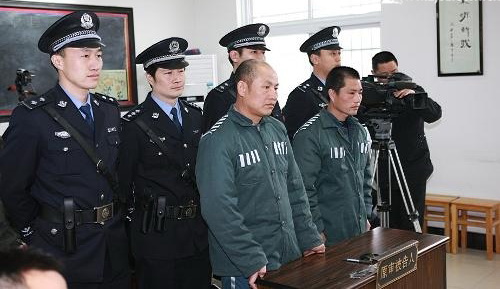


August 21, 2013
By Siu Tan
Ten years ago, a girl was raped and killed in Zhejiang province. The police arrested Zhang Gaoping (張高平) and his nephew Zhang Hui (張輝), who had given the girl a ride in their truck on the same day she was killed.
Despite the lack of physical evidence, the two men were charged with rape and murder. A year later, Zhang Gaoping was handed a suspended death sentence with a two-year reprieve, while his nephew was sentenced to a 15-year jail term.
After being sentenced, Zhang Gaoping maintained his innoncence and continued to appeal the verdict, saying that his confession had been written under threat of violence from other prisoners.
In March 2013, after the two men had already spent close to ten years in prison, they were acquitted of all the crimes.
The local public security department apologized to them and their families and set up a special team to investigate what went wrong during the handling of their case.
According to what's on the public record, at least nine officials were involved in investigating the case and most of them have since been promoted.
More than three months after the investigation into the handling of the case was announced, there is yet to be any announcement about who will be held responsible.
The latest mention of the case in the media is that the two men are yet to receive any of the 2.2 million yuan in compensation they were awarded by the Zhejiang Province Higher People's Court in May.
Another Crime
In 1995, two taxi drivers in Xiaoshan (蕭山), a city in the eastern province of Zhejiang, were robbed and killed in two separate attacks that occured in March and August. The police suspected that the same culprit was responsible for both murders and they soon arrested five suspects.
All five of these men went on to be charged with murder, and in 1997 three of them were sentenced to death, another was handed a suspended death sentence and the fifth got life.
However, once again there were many serious problems with the case. The evidence used in the hearing was simply not enough to support the charges.
The fingerprints taken from both crime scenes were never used as evidence and none of the 34 witnesses appeared in court.
During the trial, the defendants accused the police of torturing them during interrogation. They withdrew the confessions and filed appeals to a higher court.
Due to the absence of key physical evidence, the court finally gave a two-year reprieve to the three defendants who had originally been sentenced to death.
In 2011, based on fingerprints found at another crime scene, police began to suspect that another man called Xiang Shengyuan (項生源) may have actually been responsible for one of the taxi killings.
In June this year, the same court acquitted all five defendants and admitted there were several points of doubt about the case. However, police officers involved in the original investigation have refused to comment.
Relying on Confessions and Witnesses
"In the past, a court could rule on a case based only on oral confessions," a judicial official in Zhejiang said.
In both these cases there was a lack of physical evidence tying the accused to the crime scene and prosecutors relied on confessions instead. By relaying on oral confessions, prosecutors likely increased the chance that torture would be used during interrogation.
According to Tian Wenchang (田文昌), from the Chinese Lawyers Association, both torture and the use of false witnesses are the main cause of incorrect verdicts being made in Chinese courts. In both of these cases, there was also a key witness who claimed to know all or part of the story and their testimony became extremely important when it came to the trial.
Once both of these cases had been overturned, people began to ask who was the witness in each case and what was their motivation.
In both cases, the key witnesses were inmates themselves, and by "informing" on others they were able to help reduce their own sentence.
Yuan Lianfang (袁連芳), the key witness in the Zhangs' case, was arrested for selling pornographic videos in 1999, and was sentenced to six years in prison. While in prison, Yuan became a police informer (獄內(nèi)耳目) and was involved in at least two "wrong verdict" cases.
Tian Wenchang explained that due to the absence of judicial independence in China, the decision making process of investigating, arresting and prosecuting a suspect may involve more than one party in the judicial system and therefore it creates difficulties for judges when it comes to assigning blame to particular individuals.
Holding Investigators Accountable
When called out by those who were locked up for crimes they didn't commit and under pressure from the public outcry, the police departments and courts involved normally make public apologies and offers of compensation. However, when it comes to questions about who is to be held responsible, there is silence.
Nie Haifen (聶海芬), the police officer who was in charge of the case involving the Zhangs, had been interviewed by CCTV, China's state broadcaster, in 2006 for a special series on detectives in Zhejiang. During that program Nie talked about her handling of the Zhang case.
"When we arrested the suspects, we had a quick interrogation, and both of them confessed to the murder," she told the interviewer.
After being released, Zhang Gaoping explained that the only reason he confessed was that he couldn't endure the torture anymore.
Despite telling a prominent CCTV news anchor that he'd forgiven those who had him locked up, Zhang later told Southern Metropolis Daily that he hated them and planned to sue them.
Links and Sources
Legal Daily:浙江高院五方面反思張氏叔侄案
Sanlian Life Weekly:冤獄十年:張輝、張高平案始末
South China Morning Post:Zhang Gaoping: a 10-year travesty of justice
Global Times:Efficient injustice
Beijing News:浙江高院今再審“蕭山案”
AFP:Chinese man declared innocent after 17 years in jail for wife\'s death
Economic Observer: Wrongful Convictions Expose Deep Flaws In China\'s Justice System